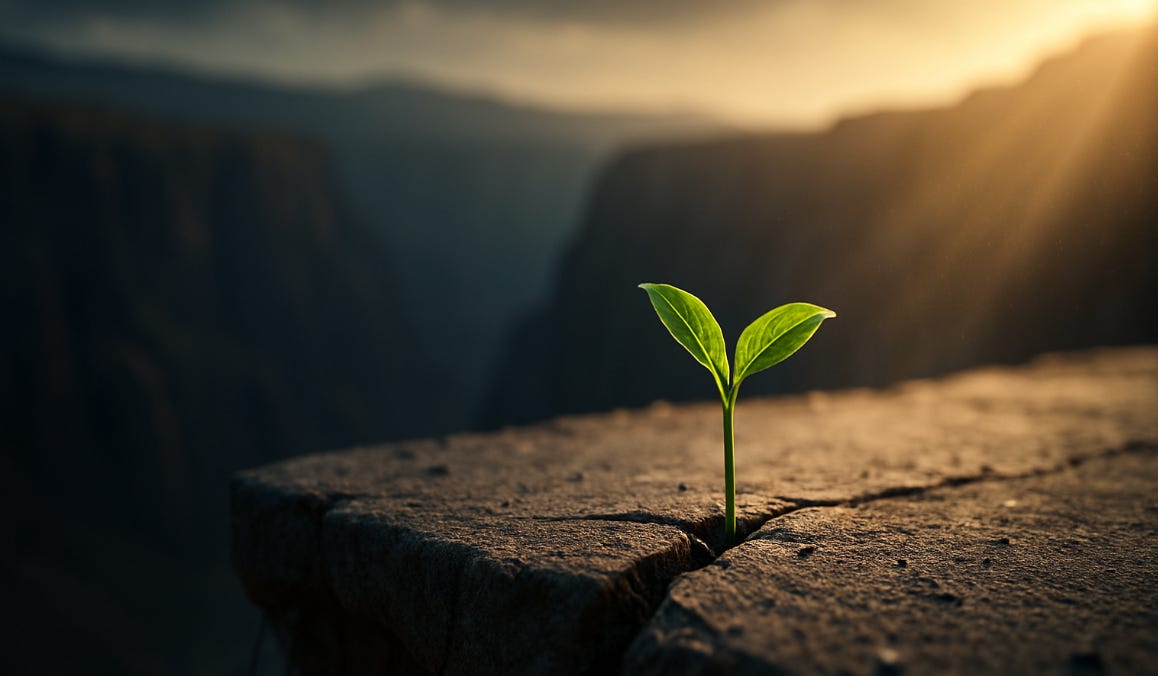A realist's case for hope in the Trump Era
The science behind hope and why cultivating optimism in these dark times is one of the most impactful actions a citizen can take to save the rule of law and ultimately defeat authoritarianism
I have a rule I break all the time: no doom-scrolling before I get out of bed.
Some mornings it feels like the discouraging headlines write themselves, and it would be easy — easier than I care to admit — to conclude that nothing we do can counter the damage being done to our democracy.
But I don’t buy that, and I’m going to argue that you shouldn’t, either.
“I’m not a pessimist, I’m a realist,” said every pessimist
Before anyone suggests I’m a naïve optimist, let me assure you that I’m quite guilty of uttering the above quote many times. Don’t get me wrong, there’s plenty of reasons to feel depressed and hopeless. And yet, the reason I still have hope is that I’ve seen what happens when people decide something is actually possible and then behave like it is.
There’s a line you’ve probably heard — “Believe you can and you’re halfway there.” It’s often pinned to Theodore Roosevelt (though his Library hasn’t found any evidence that’s true). Still, the sentiment rings true to me, and, more importantly, it’s supported by what we know about how humans work.
Belief isn’t magic — it’s a fuse
When people believe their effort will matter, they try harder, persist longer, and solve problems more creatively. And that’s backed by decades of research on self-efficacy (your belief that you can do the thing) and expectancy (your belief that effort will actually move the needle). Those beliefs reliably predict performance across many domains.
It’s not just what we believe about ourselves; it’s what we believe about one another. Raise expectations and people rise more often than cynics expect. Educators and managers have been documenting this “Pygmalion” effect for years: higher expectations — paired with real support — tend to lift outcomes. This looks like seeing someone as capable and then acting like it: offering a stretch task, real feedback, and the dignity of responsibility.
Belief can even change what the body feels. Placebo studies (including open-label placebos where participants even know they’re getting a sugar pill) show that expectations can reduce pain and alter brain activity in regions that process it. Some might dismiss this as “mind over matter” in a mystical way, but it’s actually the brain doing what brains do — modulating perception based on context and prediction. Expecting relief is not the same as being cured, but it can meaningfully change experience — and behavior.
Hope isn’t a mood — it’s a plan
In psychology, hope has three parts: a clear goal, the belief you can influence the outcome, and a few paths to try. People high in hope don’t quit when the first route closes — they look for another. That’s what we need now: not cheerleading, but steady, practical persistence.
And bias matters. Our attention follows our beliefs. If we decide nothing can improve, we’ll only spot the evidence that proves it. If we decide progress is possible, we notice the people making it — and we’re more likely to join them. Research on selective exposure shows we tend to seek out what confirms our view. Aim that habit toward the good: go looking for competence, courage, and repair. You’ll see more of it, and you’ll help it grow.
Belief without a plan curdles into slogans
The way we convert “possible” into progress is painfully simple and relentlessly practical: make tiny, concrete “if-then” plans. Examples could be:
If presented with an opportunity to call or write my elected representative, then I’ll take two minutes to do it.
If I see a misleading post, then I’ll reply with a source.
If invited to an event that can help strengthen democracy, then I’ll attend.
If I don’t have time to do any of the above (or even if I do), then I’ll make a donation to a group’s that is planning, mobilizing, and delivering an impact.
These little commitments — “implementation intentions”, in the research — significantly increase follow-through. Small, boring, doable things are how history shifts.
So here’s where I land after the headlines…
Believing we can repair the harm to the rule of law, and the freedoms our government and institutions are meant to protect, under the Trump administration isn’t denial; it’s discipline. It’s refusing to surrender our attention to the worst actors. It’s choosing to keep our eyes on the people organizing after work, the lawyers grinding through filings, the civil servants loudly or quietly doing the right thing, the parents who show up because norms are taught at kitchen tables as much as they are in civics class.
Belief shapes where we look; where we look shapes what we do; what we do shapes what’s next.
If you’re feeling spent, start tiny. Name one thing you believe is still possible this year. Write one if-then to move it an inch. Then, as a daily practice, look for three pieces of evidence — names, not abstractions — that other people are moving, too. Send them a note, encourage them! Join one. Be one. If we act like progress is possible, it gets a little more possible tomorrow. Regardless of whether or not that sounds like a hollow platitude to you, it’s the science of how humans work.
—
Sources (in case you’re feeling extra interested — or pessimistic — today):
https://www.researchgate.net/publication/233844697_Self-Efficacy_And_Work-Related_Performance_A_Meta-Analysis
https://onlinelibrary.wiley.com/doi/abs/10.1002/1099-1379%28200012%2921%3A8%3C913%3A%3AAID-JOB62%3E3.0.CO%3B2-%23
https://pmc.ncbi.nlm.nih.gov/articles/PMC11639072/
https://www.nature.com/articles/nrn3976
https://pubmed.ncbi.nlm.nih.gov/25304525/
https://blogs.shu.ac.uk/growplus/files/2020/02/Hope-Synder-paper.pdf
https://pages.ucsd.edu/~mckenzie/nickersonConfirmationBias.pdf
https://www.sciencedirect.com/science/article/abs/pii/S0065260106380021?
https://pubmed.ncbi.nlm.nih.gov/19586162/



Thanks for the positive in the darkness.
Thank you for what you wrote. It’s very encouraging and practical. This whole thing is so huge and overwhelming. It feels like anything we do won’t really matter, but you made me see it differently with your post. All of us together doing small steps at a time, can make a huge difference.